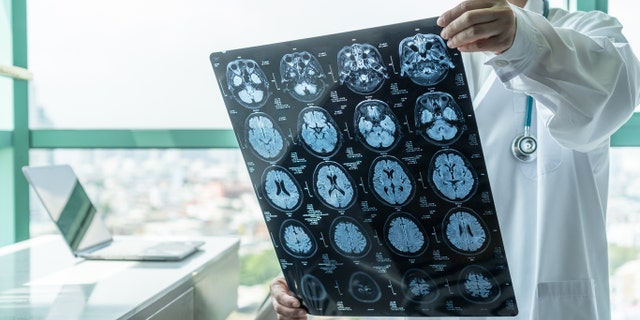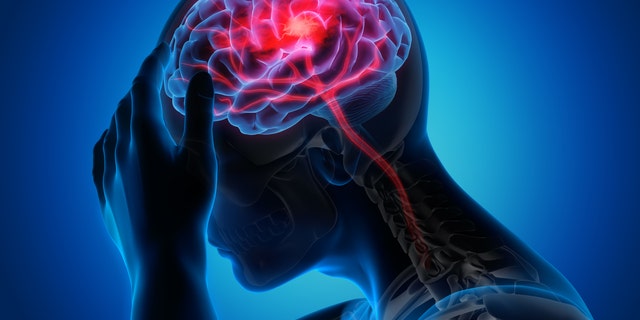NEWNow you can take heed to Fox Information articles!
A brand new Danish research discovered COVID-19 outpatients had the next danger of being recognized with Parkinson’s, Alzheimer’s, stroke and bleeding into the mind in comparison with COVID-19 detrimental sufferers, however most neurological issues weren’t extra frequent after COVID-19 than after different respiratory infections, in line with a latest research printed in Frontiers in Neurology this June.
“Greater than two years after the onset of the COVID-19 pandemic, the exact nature and evolution of the consequences of COVID-19 on neurological issues remained uncharacterized,” mentioned lead creator Dr. Pardis Zarifkar, member of the Division of Neurology at Rigshospitalet hospital in Copenhagen, Denmark.
“Earlier research have established an affiliation with neurological syndromes, however till now it’s unknown whether or not COVID-19 additionally influences the incidence of particular neurological ailments and whether or not it differs from different respiratory infections.”
The research, which was not too long ago introduced on the eighth European Academy of Neurology Congress, discovered 43,375 people examined optimistic for COVID-19 whereas 876,356 people examined detrimental for the illness out of a complete of 919,731 individuals.

Small pea-sized human midbrain-like organoids – that are basically three-dimensional, multicellular, in vitro tissue constructs that mimic the human midbrain – are grown from human stem cells to allow scientists to check how the human mind develops and communicates. A brand new Danish research discovered COVID-19 outpatients had the next danger of being recognized with Parkinson’s, Alzheimer’s, stroke and bleeding into the mind in comparison with COVID-19 detrimental sufferers, however most neurological issues weren’t extra frequent after COVID-19 than after different respiratory infections, in line with a latest research printed in Frontiers in Neurology this June.
(Hyunsoo Shawn Je, Duke-NUS Medical Faculty)
DOCTORS URGE CDC TO REVISE STRINGENT COVID-19 MEASURES FOR KIDS : THEY ‘HAVE BEEN STEAMROLLED’
The research used digital well being data that lined roughly 50% of Denmark’s inhabitants, which has an estimated inhabitants of three million.
The research analyzed those that examined optimistic for COVID-19 and bacterial pneumonia in hospital-based amenities between February 2020 and November 2021, in addition to reviewed influenza sufferers from the corresponding pre-pandemic interval between February 2018 and November 2019.
Out of the 43,375 sufferers who examined optimistic for COVID-19, 35,362 had been outpatients whereas 8,013 had been hospitalized.
The researchers discovered the outpatients who examined optimistic for COVID-19 had a 3.5 occasions the danger of being recognized with Alzheimer’s illness, 2.6 occasions elevated danger with Parkinson’s illness, 2.7 occasions elevated danger with ischemic stroke and 4.8 occasions elevated danger with intracerebral hemorrhage, which is bleeding within the mind.
However when the researchers in contrast the relative danger of neurological issues with different respiratory sicknesses, corresponding to influenza, the elevated danger of most neurological ailments was not larger in COVID-19-positive sufferers in comparison with these recognized with different respiratory sicknesses – with one exception.

Mind illness analysis with medical physician seeing Magnetic Resonance Imaging (MRI) movie diagnosing aged ageing affected person neurodegenerative sickness downside for neurological medical therapy. However when the researchers in contrast the relative danger of neurological issues with different respiratory sicknesses, corresponding to influenza, the elevated danger of most neurological ailments was not larger in COVID-19-positive sufferers in comparison with these recognized with different respiratory sicknesses — with one exception.
(iStock)
The researchers discovered the danger for ischemic stroke elevated amongst COVID-19 hospitalized sufferers when in comparison with inpatients with influenza.
The research was restricted as a result of it didn’t account for potential confounding variables like socioeconomic, life-style, pre-existing comorbidities and size of hospitalization.

Medical illustration of a mind with stroke signs. The researchers discovered the danger for ischemic stroke elevated amongst COVID-19 hospitalized sufferers when in comparison with inpatients with influenza.
(iStock)
FIFA APPROVES 26-MAN SQUADS FOR THE WORLD CUP TO COMBAT COVID-19
Though the research included a big inhabitants, it was solely in a position to assessment a subset of the nation’s absolute variety of examined people as solely COVID-19 assessments carried out within the hospital amenities are registered within the Danish digital well being file system that the research used to research the data.
“Whereas the danger of ischemic stroke was elevated with COVID-19 in comparison with influenza, reassuringly, most neurological issues don’t seem like extra frequent after COVID-19 than after influenza or community-acquired bacterial pneumonia,” the researchers concluded.
CLICK HERE TO GET THE FOX NEWS APP
“Frequencies of a number of sclerosis, myasthenia gravis, Guillain-Barré syndrome and narcolepsy didn’t differ after COVID-19, influenza and bacterial pneumonia,” the research added.
“These findings will assist to tell our understanding of the long-term impact of COVID-19 on the physique and the position that infections play in neurodegenerative ailments and stroke,” Zarifkar mentioned.